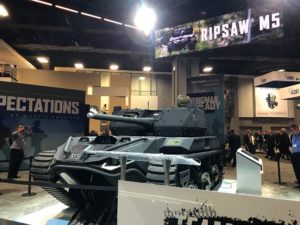The Army has selected vendors to deliver the first Robotic Combat Vehicle (RCV) prototypes, going with QinetiQ North America for the light variant and a
Textron [TXT] team for the medium variant.
Each company is tasked with delivering four test vehicles for their specific variant, with formal prototype agreements expected to be awarded by mid-February pending final negotiations, according to a Thursday Army statement.

“The progress that our engineers, scientists, project managers and leaders around Team Warren and the Army modernization enterprise have made in moving the RCV closer to reality is truly a heartening success story for Army modernization,” Jeffrey Langhout, director of the Army’s Ground Vehicle Systems Center, said in the statement. “That we can get this far already is a testament to the dedication and passion of the Army to giving our soldiers the best capabilities possible.”
The prototype RCVs will participate in a 2021 experiment going through company-level operations, before ultimately informing a 2023 decision on how the Army wants to construct its robotic vehicle fleet, including the addition of an RCV-Heavy.
“Robots have the potential to revolutionize the way we conduct ground combat operations,” Brig. Gen. Ross Coffman, director of the Next-Gen Combat Vehicle Cross Functional Team, said in the statement. “Whether that’s giving increased fire power to a dismounted patrol, breaching an enemy fighting position, or providing CBRNE reconnaissance, we envision these vehicles providing commanders more time and space for decisions and reducing risk to soldiers.”
In October, the Army announced QinetiQ, HDT Global, Oshkosh Defense [OSK], and Textron had successful white papers for RCV-L and would be issued requests for prototype proposals (Defense Daily, Oct. 21).
The Army followed the same process with RCV-M, and announced in November that Textron, General Dynamics [GD] and QinetiQ had been selected to move forward on the medium variant (Defense Daily, Nov. 1).
QinetiQ and its partner Pratt & Miller have now been selected for RCV-L with a variant of the Expeditionary Modular Autonomous Vehicle (EMAV), while the team of Textron and FLIR [FLIR] will move ahead with the Ripsaw M5 for RCV-M.
“Team Ripsaw is proud to continue working with the U.S. Army for its RCV-M program, as it has announced its intent to award four vehicles,” Textron Systems wrote in a social media post.